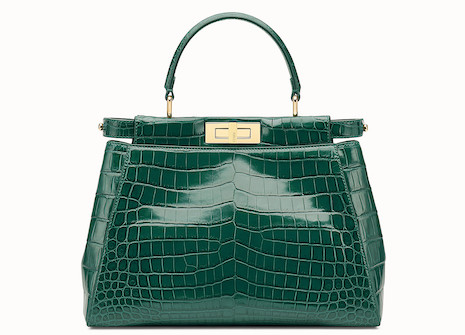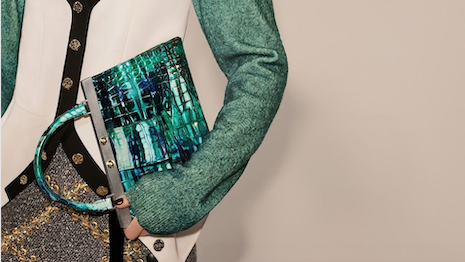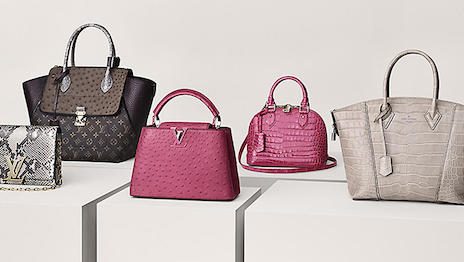Luxury goods conglomerate LVMH Moët Hennessy Louis Vuitton is introducing new requirements for its crocodilian leather sourcing, as the group continues its quest to be more transparent about animal welfare and other sustainability issues.
LVMH plans to have all the farms supplying its exotic leather tannery certified by its new standards by 2020. Affluents are expecting more transparency and public initiatives from luxury brands as they grow more aware of environmental issues.
"Affluent consumers increasingly care about sustainability and animal welfare," said Chris Ramey, president of Affluent Insights, Miami. "Luxury brands lead by setting higher standards."
Mr. Ramey is not affiliated with LVMH, but agreed to comment as an industry expert. LVMH was reached for comment.
Leather sourcing
In 2011, LVMH took its first steps to managing its full supply chain of crocodilian leather by acquiring a Singaporean exotic leather tannery, Heng Long.
In addition to supplying LVMH brands, Heng Long also works with other companies in the luxury business. The tannery was certified by the Leather Working Group in 2017 because of its high-quality working conditions and environmental practices.

LVMH's Fendi sells Peekaboo handbags in crocodile leather. Image credit: Fendi
Heng Long has also been working with scientists, veterinarians and partner farms to improve the conditions for breeding crocodiles. These years of research are the basis for LVMH’s new standards for livestock production.
The new guidelines also reflect input from the International Union for Conservation of Nature’s Crocodile Specialist Group and NSF International.
Although tannery traceability requirements were already in place, LVMH’s new standard has four primary tenets. These include environment protections, safe working conditions on farms, animal welfare across all life stages, species preservation and respect for local communities.
Animal welfare encompasses the handling, veterinary intervention on site, quality of living space and feeding of the crocodiles.
Three of Heng Long’s 20 farm suppliers have already been certified by NSF International as meeting these requirements. Farms in Australia, Zambia, Zimbabwe, Kenya, the Philippines and the United States currently supply the tannery.
Later this year, LVMH plans to share an updated global strategy for the total animal sourcing as part of its LVMH Initiatives For the Environment program.
In 2017, the People for the Ethical Treatment of Animals purchased stock in LVMH to highlight its opposition to the conglomerate's use of exotic leathers.
PETA’s decision to buy stock in LVMH comes after the animal rights organization released a film exposé on the cruelty inflicted on crocodiles to harvest their skins for leather goods such as handbags and footwear. Through its stake holding, PETA hopes that it can push LVMH to end exotic-skin sales from within the corporation (see story).
As of now, LVMH is pushing a more conscientious strategy for its crocodilian leather sourcing without eliminating its production entirely. Other luxury labels, however, are moving towards a future without exotic leathers.

Louis Vuitton is among the LVMH brands using exotic leathers. Image credit: Louis Vuitton
In late 2018, French fashion label Chanel publicly announced that it would discontinue use of exotic skins, as well as furs, and shift resources towards the development of alternative materials.
Sustainability is so profoundly consequential in luxury manufacturing today that the CEO of Kering's Bottega Veneta believes leather in the future will likely be completely synthesized. During the Condé Nast International Luxury Conference, Claus-Dietrich Lahrs stated that he believed in the far future, leather will no longer come from actual animals, in a more humane form of fashion (see story).
"It’s a sensitive issue as Chanel and other luxury brands are moving away from exotic animal pelts," Mr. Ramey said.
Sustainability push?
Luxury companies including LVMH must continue to address environmental challenges as climate change impacts the industry.
According to a report by the Business for Social Responsibility (BSR) and members of its Responsible Luxury Initiative, companies should protect resources by using less and recycling more, using business strategies and philanthropic efforts to positively benefit society and being transparent about their progress to engage more investors and consumers.
Luxury brands, particularly in fashion, are encouraged to invest in the protection and restoration of crucial ecosystems. This will help keep raw materials, such as leather, available for those same luxury retailers (see story).
The fashion and leather goods sector continues to be LVMH's biggest driver, with the category seeing a 20 percent increase in revenue for the third quarter of 2018.
LVMH's fashion and leather goods revenues totaled 13 billion euros, or $15 billion at current exchange, in the first nine months of 2018, compared to 10.8 billion euros, or $12.4 billion in 2017 (see story).
"Luxury brands win thoughtful affluent customers only if they demonstrate the highest level of responsibility to working conditions and animal welfare," Mr. Ramey said. "A luxury brand’s benevolence has to be more compelling than detractors who believe meat shouldn’t be eaten, leather shouldn’t be worn and animals shouldn’t entertain."
{"ct":"rM\/pTIn2QzBxy45FXEQyqfwwRk1QCMkBuj0ah67g7dFqcCSgYNv0UfBdOOm2DcfAdwoj0dd9NvjL0zKHV0IMNi5BzxcGxhfh58Cs+WriNI6aENKwQkssCmg5OB7KMtP+1VoxoVQZY4ScetJ2tNkzGnbqK8SztOcN3NG1\/Ozd235gp0IOKiEt\/9uGOYPjjlhG6k\/wuSbXcwRRTBD2vnRS\/jTKmFVnnfCurIs3eKN1aXffpXl8NtXLKFWvSTxfUWOoCdIOfQz+71qZd1bHsO4pefD\/3zcXpdzXjtMDjiceBygLmUkLMUj4fd28bLaSUP3qvVtM\/I1oBNaztcTOC2yh7BenjM9AfORIyY8wKC8icG653LEgT2dK5l2l35ZDUN0Thc26vxAdFStrPtV9dMCyBOWBN4ICYnnMq1SE9haivBb+NU7jizdhVt0z\/jvVZhFa6P3sGEMxwjXRdEjfkBeUkQnNpXSoBmwA3HtqD\/T5\/DT7Va+7hLsMg1XrwfYYW3m0l4OefnwcUDuWXCglrwsn\/vE3fVIGeYJkhtAIopFCgmZzICpqVJ6LQwv4dV7fSIOFuLpn2LOYsYy4OtpQE6Wd9yezERmuqrhvAniF\/Db5JDFMsmjwZKBXGXtM5glyys2HNiNaoT5rKfs9CwVD0rDcNaTSrgmllNyMeYHZY+Oa3wSp+ZawcpJKj3TFrjYmxnzuW8yOOGFyL\/SACfvhktshqpg8VsY5R7uF6mgQutRV15aed4+FJz3SroKr5gF66k3jYu\/ApnGfWyvmvaK7iodNOgLeUvrqftwvvui5CToLS70nR+RjtdrCN1ymOcOpoaOxk+IDKPDzgLGyM2LWyXq1ljRxKf4d5\/PGqzKeXI85y7S5KAv7b1VhGrMLwu\/pzTLnZQXShLQ0MH7uhzVhCQcxEpx2sliYJb\/ChcfyJZPHhYFvULaRoMQt5nLI6ZfNBB94NLnmherRQR\/O9SDVy7keFKuueEqSFiMA9bVOkBp9CSN6vKcUXoJGvvmECtnASjBI5rGsanqkhOdq1Aq+hROKFYns2UJeetqVMUJCA6b2qIMu\/\/x7oHJS4ixYGMuYmG5d33LfTFEhJpnmB6eB4NUuofrIYTrAPcwGtiHx5T8rD\/6Riioua4tH3SD8gz8CTPrYEN01ydvckAF3CFJXTRUKTpmMMTdwA+k8+ERLKW2urvHhAtQEM1erRp+Eow4xPoi31HtQ7zPmDC1TlLM\/tthBNWNLByNoyKeCyQXznWNIqYDNOWKzIWm0WqaYbix3Lt5\/oCq97htoFYVnpwgyo5eMj5\/qWDxh43jnbxoFrCwmeC1upb28BcMGzA1J6rZ8R2V1yLLgS6AVFymNkjzE6A4PIxuIfQo3q\/RCY\/PZOEyoHXKhqe\/xVl9NwgzexByfx+dm\/rvWmcujhfL2mnbWLWS73jPZ8D8G70dSm9nF6SSgz5DCDBymVma3ODv58eqDPwYZbC3j6u9rQKag8tiPdygx0HvGGFhr0ZqHZmF99kB+4BHJhy7CZt8deACPsFYG5jb+eomHW9Z3nDJ+sRGLZzDjgfJF95PmSrxhMTFET5kfKfcE57CozfkbCoWVV24YTERbPrnfSZ9RjRLUMDphCxYRu7qwEFs21q83zUJ+a7XcYxOKMeB+4+Xo0k2Y6dDofiK0sn6QPjKsyvsieWyRTSeqAS13wDQ41qi8CT7YGEhV4cwpA9KkxDUSNeqG83uxC5YIxm6eh2vEwDAwDhN0IDACNuXSB2uQIgz4\/WoySEIofwXj7kXzYtYHF1POwtyaxgZlQ4vM2GnUK7w8qHG7Oab5SjqCA8OwpMCKV6WzYcT6lHP\/VL1R23kjcw8cBQfOpuYmU42Dsc0pOLKqydNVYflD06JzpxiJFtZXdflr4xsttzkPPsGOD3Utm77bvj0Y1ID4P93J9gK5ay5kEcXiVm1HFTyuFUzHkK7XzaV9W+ZF8XCGAf5MsOU1WjPsDM5tvjk\/2QReSjpVS0VFYEKy5gALx+6hZZCFbhSveaF+eNT3jYZxF36oVSyAiujae5RmCuY\/d56J02d1opp6h2dqBfX9WHxNNsdmdd9phQLMT\/4x4c\/A6Ac5q9JpxQiWg7FwvxGodvzhbSRfyOQqo3fr\/vMd2DMxumWlt3uu8ZhG82RIGIqCAczkxCu9q8dFx5SWvPJULf9jxV2h3z2QBUVB5Al+xsBenrYciQlCYeGB1CH1zPCMviuj92eThNtFeHmiugJlyPwb+bjtSh0mx1niXdT+EdW66V1UEj1wRG5lM5ySK9TJe2gQr2SWIzyqgpMrNUCoc\/H3IDiAwKvPzPD0dHRBQUlcAFJPzCS4hnMYUDBm01Nmog9r+orYw2DtzeMDjxJGKa3t4p9q15h9WO\/REsBoQuuq9sTOB9vEN6nG13dseWsrOu++lEpKNzRtJG27g+Wx4ASkKQs306q0wivBHQCgkO3szIQf46ujACgUGGb5WaB5n6skOUCiZG81Rse4Jfox\/syRkAPzS6hEuURhq94y+LcbgBmwgeivd6T0+q3Jlo6EpJSzqo8MaHCEkmwVRCEXaB0KD42Vl0axDNV3q++SCXHrt5NFSyCiEMn4pyr4tNqcmrWs5ILO242Q6AwIkqvnhaS4GZBWo5LsbkgtwV4UBYHnvnRRfj4mgEBw9t0kW9Bqgj4OVSjRnYMwltxdZ9cEOmZbWBKxOvMK\/nmRe7qnEs2NMvKODvMiYJ7G+PGfb22ET7WBDQsJY+WYMUD5Ifl6Qcokp8PO1BuJqkWjwdlk8orRNVeQWhLilws+nHXL5ofu4U0HJVkrjzc55QL4W7DzkLL0frOBwlRgz\/jIdJBFq0N2cKvg1RHGwsitFWAwo3iM\/tJn7phogEzFYMQjjUUuzl\/ZwDcJ3bu8aZMeV5XCO6PdP60N00dkRpVjX2DgUUD43NpdGm8MB561Aj5kBWYXt\/b6U3cSxhII5o6PSACpEhAvX1XbyjwiuVRP+zI2Pdjhv\/fvYUhGUG6HKMvkUkwM6LTZPNTJGTi4ZQX97kQdkXj6IjEmwRzd7hIKhGN0VBHrtvEs5UVW\/6vkUTEHDFjTENcAvdyh0aPEKEUCVmcjh9ArSJSVOwVSw4wrwv1qggp6EhCjeAXZBiy5Y8+QhU4GfC3N3kMI8gnanF+dujEGNgrxCPQBT6NUweN+\/hjTaYtBL1eMReS\/B2hqaGf8yyX7Xff8ZD4DQeB76szJsD303byOJc7S\/kRKKjnr1GHExIgCQqEGabu+zf+BkMdi9N\/xtray9yZQsdvOfJ5LYNDc9NVcU+AAmhiab6MLq8p60qPGimyZTYo+SrKePfixD2vid2csTcsH3rHW+lWeLiWGR3zzyIHwVY8wPSnS2KLwXt5r0aZaqlRo7fDisFnWHT0XbZycWi4AL1GOV4QgwIEoUjvF5KRcw6EwTrNJBLv2MvkXWsRPNqLJ9ZHHrY6znU9f53XxI8R0I3VQd1GaqMnoZAaOpJ4r7PR2lLa6E8sGbfGZR00GV14ApyC8EQ2ld1RER\/7Rz4gRgmaWxPRjxoEm4bz3hBcWSkzg\/AvKlgvRUbBexf6Z4Kll+G+utXJ67xEqDnoioxf9TGOrfZRUuGn\/DUkpk3hO0rCZZPEyUTsoByljEfEygsqKl1+UNH1N0FVF4UW0p+QoxuaGg2pC0VSk\/8RkVfh2ZIUeb3Avj8sq0dXd08xr8UUcsE5\/imJeOhd4Qa2ynSw4qyVtjh1lyWuLaKF3AX6ixeYeX6VzGXCUpCqfkV2ZRtBCMS9effbdvaoy7JVPdk1Ybc97Rmq2zFBSGB0k4emMVwaR54mtTm6VvjA82fRZ+bvxolW00rpi1U1i5VdCebl8HE4YLCWEjnXGLXnRJfBnk5HOPF0XVSsJNTfJsqkSMv51w\/GC6jIizf6xEQmqztaUKVFxEzTaKA5RTTiyC6SK0\/ZbcVidUVRwMwDijXkEgFx1osmbdAkYqKviOi2QCbsGcq+hyKgq6GYWP+Ne4yZIfGGLdT1CdYLwY09zs7Mqv2OXvHug4DAGdMheQ66Fm5KZEwhkXmbdRCYyxWwoecKLXHWYR31nWqlsLqXZ2gfJZd\/\/XliuQfFkamuRtoamw6Oe+wz0963Apd81lfma1XLashcagA5QXTS7uR6VO0ANib246edhj60uD9NQMPvnusJj6IJyT82qGyaoivSh6qXCgBN\/S4JEXLoultvZ5iNTDZf83DzLwaUDLF5Z0QhpifqwoTAK9AKkf4Q8lFTT+pqCzNcUpWWJ+CFFIts4UaNrV9hKRh4+pdVEAOeANXd4om++rIC03jRy50E7FymO\/fsMQ1o1wmOGBV43iWBzOsY2NA+Jdrl4wf45J0RW78MexBv6xyeRIsZ52Uv0isPcmRdBCg6wGzJxyefCUkQqNMAZG5HNUaAj2MMxZqZOe6PXBMPSwLWGiweA5EsudxiErbgbxuRqd7chLyTZK6Y1cpnu8N3bFZNyzS47af\/l4FcIalQVoOxxl0Ncq0zmdXXxQKUrErQJXNoi+H+3g98WJppuw8SoFsENHZFKOqYZwL9pRVHvxZZtZdtR\/YHUk0ml9K5A1PhCG0wnhlW1nM+ZaqVnvTEyH\/F4it\/9zhrEPhzisGL0uRlUCVzkTBtpuYk6HIZ9s7ppzeKb8O5C\/IHK0SkleMVvJUoQ+1gtzwX7hLIfwnWSKKf1XQ7+0e6Lwr\/n132WNsgrKXu7mR1AN\/lPEwWUulOYNuNcZFrdagec11z6Fc4WDhTYISydrfFSAdF4TPi44bFpatcQYWtzWkvKS46NRYkItbgEfn6WM5U+8D32KOQ7N1UXHAmjO6Ab1UgsKmeZNP5w1bzQwrAXbbIz3imvXcXYF46fRs05X1S9cHlZ1aHpzelHDLSGJ39kvRNliapct0ZTJ4iZ8s1sk\/zg9Q6ly56m3Kz20PMNGTPr31CSL4wlZuAhvROa+7mKMEL60oP3THX9bx0Il2TFxqQYaz9HJwuBNBNzUA++kA4T\/PyGFEFTdOyFmEji88T1D7wYHmgHT+07q7D7yCYvMjFaZgUXHLXty8yl1c0Zice\/s30lDNG7gTQgLkOd6ypyu9HoCatKxGMPUD\/4UN+utJbjy2PJ3zikHk4TRMJ49HCVsnqbthqQBJ3f7Ry8r9VBI+5VAcigCZfLDKpjajKzvXGX+t+bwOOy+6VVa9+uHrKZ4H4mUm7JwhwHbWdKQhhZnKRVR1j1p\/OUopluMZV\/1qtzxf9M39ktKyWQ\/q+3aDjGhJSRZ4V\/OKoZuDCpioyVnCqwhNfBlFPDWWYtPwkNiIMB8sT6aeoS0qFxWodYi2OI\/SIKV5EwhkFcgEU6tGQy+Gy5HaTlrwnCieeWDndOKAtPRpzZ\/u5raUdGdvm8b8Y5jlELm8MjQPU79QJZe2eHIWz6YroJNRjNP71BLK2upA5QlCLuB\/GVi1kIWdzqgKhxAR\/2vkGTDMYTpP9oTPvvCHJsZiehXAt\/awNw1d8DJhWvb1g3rI+nxK91QgaeMVl5NlGcg3KSwowgrnhTuXGR9q2HduiGRMS4\/ZCWVADM3m2ijy1KqTz4YVgjcxN48yVyzc9kX\/Tn2cSZN8C3xogNsRj\/ySTSjQjz+xhB\/JBJYLKsAOOhNVGVSrD0y8EgVpGFna\/SjxY4DzQAnd8Y\/ypnIdqn7dOIea+SKDyos1Ua1tXxwjDSQKUiNV4rb9xOlglMGWQ\/Qhi4lGtigEtlvf2kd0QI6etD2Ma1xb4e39RhUmTZTHLtoX9SRKwmFqpEtUBvL6tf4gp8h6XNBCaZy203dvBGQNmvzSOvKpPOQuMXU8PLpZ72AS13sf37PKi3hkXx1NotvyBYkxkksT80bz9peeSMdPUNjPpXgc78OdUKqLlupFS+RDtPL9AP4O34a3juQuAeNdSgZYxR99WD6tve+O0+Nk1VGdZXzH872\/hJ62j3CpLB\/vzJLg\/GFEIb2k7opB48Zyv0dtsiSiu7kKnmneXaX72oATnLr0H9w89aJRruY1YxnXvdiwEWfl\/5qAPMLbbG9DS1mD1o3pHzEKS\/j4j+XCxkt6zQ8w4KwaLyaXz\/PN3ek9lArlmQSpJW+u05X2NmF4pjT0J8hOcOcJJalxglTHJCihIU\/Wyb9riK3\/0iWlPNy17fde08yvcDtkw8dEDQ6E4lauAKweKnBSeZi\/E7Fd8YvQ+2i4NKyyxUeQNKdhqbBXXusp\/V3Z\/Apr6XYZyrJu\/OiO\/8WGj0Exqpu5kMPrwuaFomqvSmZuoOsAj3OAjwEER5zmg9EZTeiGh5EpbMAG4uAZBRcyDzbFAiSfrzdfQa12AwGAFxwS0CMAUP0yXJx\/6zrrhH4hFtQUMAV3y1DK7qwstAu5JUcNgdW657CaeFR+RUahqyVlT7RoyGfkhxQDwzfJ8JmdEWTSdKPPCKN\/\/yh4Jd8RpaVAVPD9DG+xvJfFPM7dZ03mckr4xNNaObs9kiMFwyf4e0q3M+Tkpp1T94OW4\/xv\/0A1QvlLqN6fYosqKGm60TwnnL45dBRiBb2y9FoAfbn8ELGqbE4Fgkp28CwnRiUFgdOyf0cV4gCFFyZi8kQg\/m\/rAMJtpyVr34lSdmdDsRpFIpFaUtYpUTnep85ZFiZwLVTbPlE0CCrLDIpi+3HCptYmem1bK+7bWS7ZRPbRmYs+4JFUiaQv87hNdoIGaGB895mpkjHhL\/HifkL\/eMZyqfYh3FTF7pShjElUFhRrvOX1PDrgra7vL3wmhlfXNBlmjlSqrFimpKHk9UmCGN\/UZER6SDWYTeDsTNEMmEeqoubX9LRFrxrU2tQz1\/QdnpdquujTjxqYX4l\/AzCvWL2b2kw165n06A1mKD5Ag+dQ7jLskBrUd1ypaeQU1Q3DqvrHdRGdRquyM90ZEGM1qY64X3RE436u67vT\/+VlqJrZno7oM6lt5PYns5qz8mJWctqS0\/NSeWO2VgfXHef+5AKlBbVbTzFR2kFM0\/8jFYJ\/bQ094eKUWeYtgnUzEkI1I1zXi+0so3lQ7OKKasa0Wlr+\/lsE4LoVbJVoe5441jOWqhTHJ6yxEe7wJIYB0pxZ\/gaL9GY9nPJVPowksl168G68ftfUUSd41lSiG2nzIbAxMo1RYrAAeHjxk5P6LdtveNN\/YpgHwB9bGWd2CEwL9W\/8Gp0PqVBfNUwT2Av6eZMnskrSIQMkJ4gBymI7+XkgkKIf7og697kUUsxArBcOW8qhiL2c2dwNzqiOcW0naL1Z4Ai33Qa+CwSMTNQIeqqMQSajOcEFOoaqmkJnciKJCFUC4cbXDdjXJHcI0ojvHi1LgO+VD8LJ50Qt+PWNFFUiE5flkd7uq5zVOvHp+9LP3QHtAtR8Un7++4kaqKGVEIihZJUTJiJK0+z8azDCayyn1+QIzmDOa9dCq1v\/Ubh0U2GrXeRvAPHMF0BvwnHRe3tht2FkKMtz4oZNxDBh13lZ7K6iO2rwoWGzh+GUesftRhHfesLNUuQ+g4zxR1Yx1mHW5R4lih7hfQAGttkdfPgFiNKkHDlRHlx0Gjvh\/JHtMrIuvWhFZEt+1V0P\/\/PSydwBx0+yGMap20fqPI2kquEqgzRFbFMOaFAKq95kiVAIjNjCXXS1H6Yxw\/l1zoGCMQAbmywBiClRHWA6zGYFD8kpwa\/W7w1vQH31i0u1Cm8FNBYz5Kl37C2a\/LS03SOhJTrDZrSIpHCd2ARpW11Pyq8632BANABkr7WjcCfqPYMvMXHB15BZGlVPDPJn3SZV6mQ2HB0iTY3\/9z9li7wLmZ3dHKf98TMHC708Bwspf\/sTKMohYNFfCi+F187DeltB8DdDe0Ff4uZ6uxrLLlLDT5tvPmUHrz8X0BX1rps5u75wN9VqljNQvce6s537azgRuIgEGio+Y\/ZTXjipSzNrXThUOBDkkgCpm9ySakjv3DB7FQVD6Yq3h9fTOFgNwNoh2oEaJKWpyJVAQs91wI9dQnNZ5ywEolUgxDV9ckTJlQVxtzOeDCQwgg3E9xWzNZOg51eWr+zG2F0mz3k+uAHamFitFiNN6600Tfz4mHd\/O+8qJSPeyKPjLo3psKouYUzK7SwNxc5Gy2ArQTI9xpgw3LVV1bI29Dd117UBgFsYQH4LH1MPIzCQEKgJLhpfp8KM7UkOIgx3g9aRw1Y+KJgtIrEYonP83+fRe9w0uwbq1LTK27A982saCN5FK++gO7tWyaynEiSMG63UrVZmdw11\/Uomg00mkaMHQpS\/qovitnbZhtiwiLkewgv9TYPZP77b5zLdjrgWgQJoF3bM5xPSOGSVa008WJ9LH3v+L+73iFpPo20t05a9X1CT5EPJJWJe\/fpugq+F9cveCRELBmrNK5o86TmzJYjFCgz8abRFQm6wt2nsljd4KMnP1BRoMvBqUT\/XcpU9ijBxiijTw8axHVq+MoatM2BPFP8FVgTipojae2v7nCd1hRTRRuTMeWehfnet9f9pkxZdi7dOhmkzGehTyaY4GG5+K3TQ5eworoyoEl+wdn4ysAbSvxBtDUpa4zPRWucchw07eyWm+qu97MXMiABPndhCyE8EIqKwi9ADZ0NtuwFsYpDvL35QWbbfIfTcg7pt1K5rkBDK8B86pFDNU0bSvow9tiEyMPe\/d4VoGzsIFv+TTzL8j8hIDXWkTfNF9077n1igqwH2hYXrPJ6wa0GLqLc2EAqdI0bpoSq0GTwM4Z3khbqaY751waBODvmGOmNaR3rmbhuLXviYDDPoDQ9sjFpld6dMDBAzSrIrM4l2W3FwT89+GgqnN8TJEGvx5y6WvKGNhKZc0Qnpy3MsUzTZCmSFeloD\/MvMzCI4Yj5hsA6oPwcIlI5dvCHldWVOtFTtzmuEy5suA3x\/ulOFqkzFW06KChFS2UsiqUBjXEMiEQQDNH3Z2o7ua3Q28KfpgCi+sNQLZCI2ne0O4fjwJnLVhG1Ia+dxX85KSCKqkysnmuEm1MetvzQP9Uod5u3TBix3jNxVu5JxbIksjFK7vyqmDOg\/iTE1wFSY\/ZR36ST4zPPSmsbulinLh8xVSvg1gDj6JA26JKGNM7jsA6feaCxUICcMNoXxHmceeWFdySF3vQK0ilUvZ7kvzEaSqF9LyJEJQrHxIvpF7TQ3lxPGyMzaof\/sdNgX5XSNDiDW9cUhP19o8oVh2LVauFhGYz0YEzpwuirRWIdrNCprkMCqezotq3bHe6u7z7zAWYXioFzKJxq6i7iZAvMXITMMRvB0S3spQhQdlHvQTBsuAXVToUNulcn3EPsPB\/hwK5Au66X+XWnc7M8Z2XLmP1a1cnvWpbZnPOG0mCuCn6ycrcJ8zSA6r5kqQeVew3hXbc9okIlwfzPt8xDbp5oRVtmPgNfOasSgKKawZI6GEikg3uT9yMsODhSERJV1DiHP80CkGUH1jSzwd3yh6NkGuSQd8vYVkDfirCkWHjO+dxnGQg\/ssWQgYHhMr3NFeUBcOsp\/3h17VkzIqUSUv\/i\/ouPJFlDGt375cV380I+oFDFW6ZzYDKF3jDvQan8rBNimM0snAXmdlLfAyC5Oq1WbIUyvRk00bL2Kd6HMt4M8vrmpjlV0XdKd6F\/1t+CSUoQn8m67lAhcgXhXIRxkdTiVP5fE5u+ww+xXZ80Al\/KblPlrY1cXtNK78H40do9Cqwfj0sBdfK3X9MPyG1Ii3dw8oeQg1I3lYrlGp21eaGOx6n46uPOw2IaPkjrwr0RPk\/7gA73e5Jz8obqzXpiq68Ngwm5wyAOcG5aV9E2kCrpl4tpDBxj77eXLQCB9bDbw==","iv":"b799150214e5414d875f7e501df2cf7e","s":"dc03ff3fd0f71d26"}

 Louis Vuitton's Rare and Exceptional handbags in exotic skins. Image credit: Louis Vuitton
Louis Vuitton's Rare and Exceptional handbags in exotic skins. Image credit: Louis Vuitton